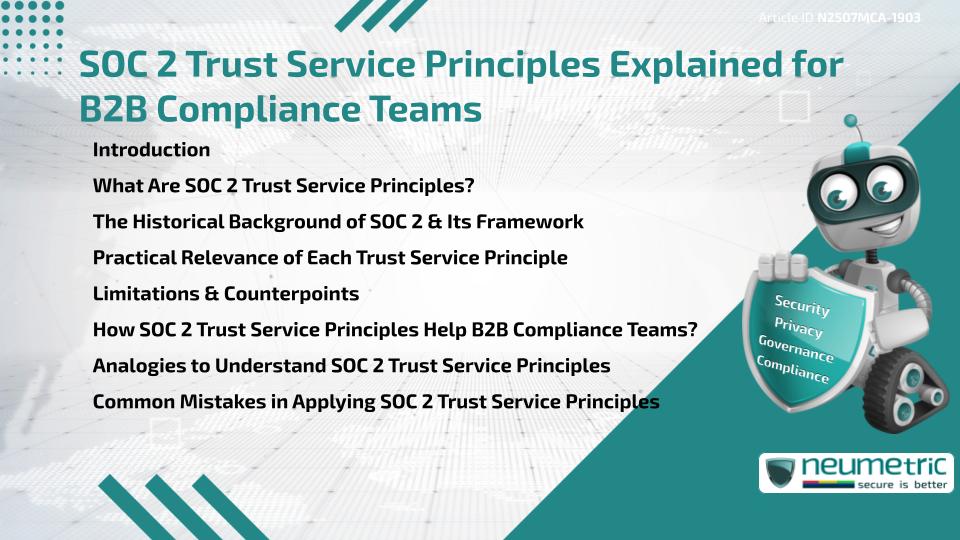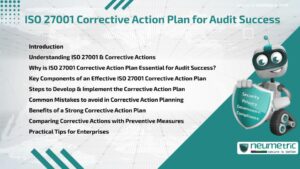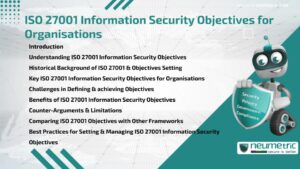Table of Contents
ToggleIntroduction
SOC 2 Trust Service Principles form the backbone of compliance & data assurance for Business-To-Business [B2B] service providers. Designed by the American Institute Of Certified Public Accountants [AICPA], these principles assess how effectively an organisation protects data & delivers reliable services. There are five principles: Security, Availability, Processing Integrity, Confidentiality & Privacy. Each plays a critical role in defining & measuring internal controls related to system & Data Management.
For B2B Compliance Teams, understanding these principles is not just about passing an Audit. It is about building trust, improving service quality & ensuring regulatory alignment. This article breaks down the SOC 2 Trust Service Principles, explores their historical roots, explains how they apply in real-world B2B scenarios & outlines common challenges in their implementation.
What Are SOC 2 Trust Service Principles?
The SOC 2 Trust Service Principles are a set of criteria used to evaluate the systems & controls of service Organisations. Developed by the AICPA, they provide a Standard against which Auditors can assess how well a company meets defined benchmarks for system controls.
The five principles are:
- Security – Protecting systems from unauthorised access.
- Availability – Ensuring systems are available for use as committed or agreed.
- Processing Integrity – Delivering systems that process data accurately, completely & timely.
- Confidentiality – Protecting Sensitive Information from unauthorised disclosure.
- Privacy – Managing Personal Information responsibly in accordance with legal & contractual requirements.
Each principle serves as a pillar for system reliability, especially for cloud-based & data-intensive B2B operations.
The Historical Background of SOC 2 & Its Framework
SOC 2 evolved from the broader Service organisation Control [SOC] reporting system introduced by AICPA. While SOC 1 focuses on Financial reporting, SOC 2 targets operational & compliance controls. The Trust Service Principles were introduced to bring structure & consistency to these evaluations.
The principles originated in the early 2010s as companies began transitioning to cloud computing & SaaS models. With these shifts came increased Risks around data handling, uptime & system reliability. SOC 2 was developed to fill this gap, helping service Organisations prove that their operations meet defined, independent standards.
The historical shift to SOC 2 also reflects a wider industry recognition of non-Financial controls as equally important to Business Continuity.
Practical Relevance of Each Trust Service Principle
Each SOC 2 Trust Service Principle holds specific value for B2B compliance:
- Security is foundational & applies to every SOC 2 Report. It includes firewalls, two-factor authentication & Access Controls.
- Availability is vital for SaaS Providers promising high uptime. Service-Level Agreements [SLAs] must align with these controls.
- Processing Integrity is key for Financial service providers or platforms managing data transactions.
- Confidentiality applies to proprietary information, Customer contracts & internal documentation.
- Privacy affects how companies handle Personal Data in line with regulations like the General Data Protection Regulation [GDPR].
The relevance of each principle depends on the services provided. Companies often select which principles apply based on their Risk profile & Customer expectations.
Limitations & Counterpoints
While SOC 2 Trust Service Principles offer a reliable Framework, they are not a guarantee of ongoing compliance or security. A SOC 2 Report reflects controls at a point in time or over a specific review period. This limitation can mislead clients into assuming consistent performance beyond the Audit window.
Another concern is cost & complexity. Smaller B2B firms may find the process resource-intensive. Additionally, because Organisations can choose which Trust Service Principles to include, some SOC 2 reports may give an incomplete view of operational security.
Lastly, SOC 2 is not a global standard. Companies operating in multiple jurisdictions may still require other Certifications such as ISO 27001 or HIPAA.
How SOC 2 Trust Service Principles Help B2B Compliance Teams?
For B2B Compliance Teams, the SOC 2 Trust Service Principles act as a blueprint for Risk Management, operational transparency & data assurance.
- They clarify what to monitor & measure.
- They simplify Third Party audits & vendor due diligence.
- They reduce ambiguity in control design by providing criteria for access, availability & data handling.
In contractual negotiations, a SOC 2 Report acts as tangible proof of internal discipline. It also enables a faster onboarding process for new clients, especially in regulated industries.
Analogies to Understand SOC 2 Trust Service Principles
Think of a modern data center as a bank. Just like a bank protects your money, the data center protects your data.
- Security is the lock on the bank vault.
- Availability is the assurance that the bank is open during business hours.
- Processing Integrity is the teller correctly counting & depositing your funds.
- Confidentiality is the private meeting room where sensitive talks happen.
- Privacy is the assurance that the bank does not share your details with marketers.
Using familiar settings like a bank helps demystify the technical aspects of SOC 2 Trust Service Principles for compliance teams.
Common Mistakes in Applying SOC 2 Trust Service Principles
Despite their clarity, missteps in applying these principles are common:
- Overcomplicating Controls: Teams often design overly complex controls that are hard to enforce or Audit.
- Incomplete Scope: Ignoring certain Trust Service Principles can leave critical systems exposed.
- Audit-Centric Mindset: Treating SOC 2 as a checklist exercise, rather than a cultural commitment to Risk & quality, dilutes its effectiveness.
- Lack of Stakeholder Communication: Failure to involve product, IT & legal teams in control design can lead to siloed implementation.
Avoiding these pitfalls requires cross-functional involvement, Continuous Training & leadership buy-in.
Takeaways
- SOC 2 Trust Service Principles provide a Framework to assess & ensure the operational integrity of service providers.
- B2B Compliance Teams benefit from improved Risk visibility, better vendor transparency & stronger data Governance.
- Despite limitations, SOC 2 remains a critical Compliance Tool, especially for SaaS & cloud service providers.
- Proper understanding & implementation of all five principles drive long-term trust & Business Continuity.
FAQ
Are all SOC 2 Trust Service Creiterias mandatory?
The only mandatory criterion among five TSCs is Security. The remaining four are optional depending on the services provided & the Risk profile.
What is the difference between Confidentiality & Privacy in SOC 2?
Confidentiality deals with sensitive business information like contracts & Intellectual Property. Privacy focuses on how Personal Information is collected & managed.
Is SOC 2 relevant for companies outside the United States?
Yes, if the companies are offering their services to the U.S.-based clients. However, they may need additional Certifications for local regulations.
Can a company fail a SOC 2 Audit?
Yes. If controls are insufficient or not implemented properly, the Audit may result in qualified or adverse opinions.
Does SOC 2 cover physical security?
Yes. The Security principle includes physical Access Controls, surveillance systems & visitor logs among other protections.
Need help for Security, Privacy, Governance & VAPT?
Neumetric provides organisations the necessary help to achieve their Cybersecurity, Compliance, Governance, Privacy, Certifications & Pentesting needs.
Organisations & Businesses, specifically those which provide SaaS & AI Solutions in the Fintech, BFSI & other regulated sectors, usually need a Cybersecurity Partner for meeting & maintaining the ongoing Security & Privacy needs & requirements of their Enterprise Clients & Privacy conscious Customers.
SOC 2, ISO 27001, ISO 42001, NIST, HIPAA, HECVAT, EU GDPR are some of the Frameworks that are served by Fusion – a SaaS, multimodular, multitenant, centralised, automated, Cybersecurity & Compliance Management system.
Neumetric also provides Expert Services for technical security which covers VAPT for Web Applications, APIs, iOS & Android Mobile Apps, Security Testing for AWS & other Cloud Environments & Cloud Infrastructure & other similar scopes.
Reach out to us by Email or filling out the Contact Form…





